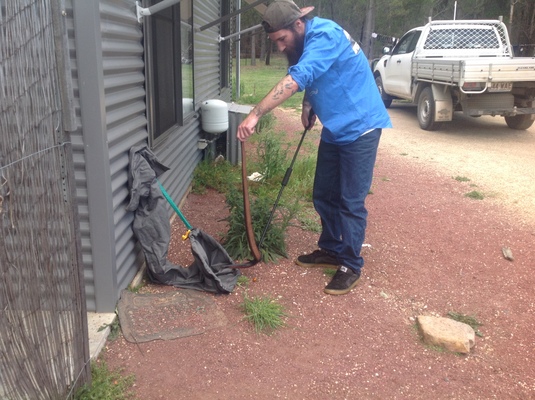Local snake-catcher Drew Godfrey has issued a gentle warning to residents who live in bushland or near it, as snakes continue to come out of their winter ‘brumation’.
Contrary to what some people believe, snakes don’t hibernate during the winter months but instead go into ‘brumation’, meaning they’re awake but are far less active than in spring and summer.
With the warm weather now here snakes are on the move and they’re looking both to feed and to breed.
As far as snake behaviour is concerned, the drought on the Southern Downs and Granite Belt has some important consequences, not the least of which is reduced access to water.
Drew Godfrey says as a result snakes are likely to venture closer to yards and homes than they normally would, but the good news is there’s a simple way to keep them at a distance – and it doesn’t involve bird netting (which is illegal, in that it’s against the law to kill a snake) or snake repellers, which Drew says are a waste of money, more likely to attract a snake through ground vibration – mimicking a rodent – than keep it at bay.
That’s due to the fact snakes are deaf, and ‘hear’ through their bodies.
“What I advise people who live in the bush or who back onto bushland is to put out some small containers of water – ice-cream containers work well – out past your fenceline or along the fenceline,” Drew told the Free Times.
“Snakes can smell water for up to a kilometre or more depending on the species, but if you put some water out it means they’ll be far less likely to come into your yard or even inside your house looking for it.
“The extreme of drought we’re currently in means snakes will obviously be travelling further to find water.
“They tend to use fencelines as a guide for movement and they will generally rather go around a fence than go under it.”
That said, Drew has been called out to remove snakes from the kitchens and laundries of some local residences in recent weeks – the more likely ‘wet’ areas of a home – and in one rare case from inside a child’s toy box in their bedroom.
Stacks of timber around homes are also attractive to snakes looking for a hiding place.
But Drew says there’s no reason to panic when it comes to snakes, which only use attack as a form of defence when threatened.
“There’s no such thing as an ‘aggressive’ snake,” Drew says.
“The best thing to do is to just leave them alone and let them do their thing – right now they’re looking for food and for mates and most of the time they’re just passing through.
“But with the dry conditions there is a heightened risk of snake encounters, so it’s important to be aware of that.
“The drought has also meant that prey animals for snakes have been thinned out so food is a lot more scarce.
“The bushfires in the Stanthorpe area also mean snakes are moving out in the open a lot more with vegetation on the ground cleared out.
“In most cases snakes can outrun a bushfire unless they’re close to the point where it starts.
“As well as water snakes can also smell smoke from quite some distance away – during the recent fires my own reptiles were freaking out and trying to get out of their enclosures as they could smell the smoke.”
The most common snakes in our region are the Eastern Brown and the Red-bellied Black, and Drew says there are a few myths and misconceptions about both species.
But he also concedes the extreme drought is forcing some unusual changes in ‘normal’ snake behaviour.
“Black snakes generally prefer wetter locations and their usual prey is amphibians and reptiles, whereas brown snakes are mammal feeders,” he says.
“A larger black snake will sometimes prey on a baby brown snake but generally speaking the two species tend to avoid each other.
“That said, I did have one instance where a black and a brown snake were sharing the same hole, but that’s really unusual and it’s a sign of the dry conditions.”
Drew is also a member of Granite Belt Wildlife Rescue and he and other group volunteers have been dealing with wildlife injured in the recent Stanthorpe area bushfires, and says the impact of the fires on native animals has been devastating.
While Drew advises locals to heed his advice and “leave snakes to do their thing”, if you do happen to encounter one that’s chosen to take up residence in or around your home he’s happy to safely remove it – give him a call on 0458 491 123.
For emergency animal rescue in the Stanthorpe area contact the Granite Belt Wildlife Rescue hotline on 0418 144 324.







